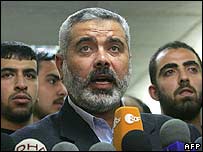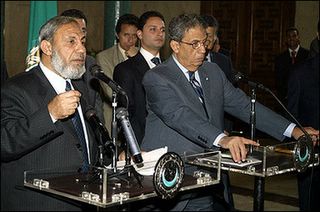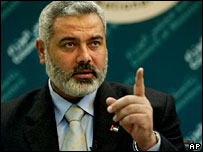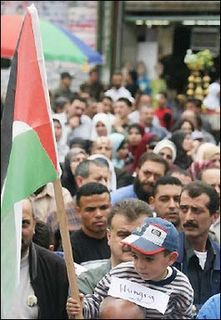Aid to the Palestinians
Hamas says it has raised enough cash to pay salaries owed to Palestinian workers but blames the US for pressuring banks to block payments.
3 May 2006
BBC News

Hamas leaders have been courting
Middle East states for aid

Prime Minister Ismail Haniya said Hamas had gathered new donations from Arab and Muslim states after the US and European Union suspended financial aid.
But the US has tried to stop the funds being transferred straight into workers' accounts, Mr Haniya said.
The US and EU want Hamas to drop calls for the destruction of Israel.
Many Palestinians directly employed by the Palestinian Authority (PA) have not been paid since March.
Hamas dominated elections to the Palestinian parliament held in January, but has faced a financial crisis since forming a government.
'Problems'
Speaking in Gaza City, Mr Haniya criticised what he said were US efforts to stem the flow of cash into the PA and called on Arab governments to confront "US pressure".
"The Palestinian government has managed to collect the necessary money from Arab and Islamic countries," he said.
"This money is largely enough to pay salaries but we have had problems in terms of getting the money.
"The problem is the result of the Israeli occupation, the American administration and Europe's weakness as well as banks refusing to fulfil their tasks."
Earlier this week Hamas said it expected to ease the financial crisis with funds paid to workers directly from the Arab League.
But Arab banks fear that if they were to assist Hamas, the Americans might take steps to freeze them out of the international financial system, says the BBC's Alan Johnston in Gaza.
The Palestinian Authority employs some 165,000 people and the UN estimates a quarter of the Palestinian population relies on government salaries.
The world body has warned that the humanitarian and security situation will deteriorate rapidly if Palestinian salaries go unpaid for much longer.
Arab League, Palestinians seek method to deliver aid

Palestimian Foreign Minister Mahmud Zahar(L) holds a joint press conference with Arab League Secretary General Amr Mussa at the League's headquarters in Cairo. Zahar and Mussa met to find a way to deliver 70 million dollars in badly-needed Arab aid to the Palestinians.(AFP/Amro Maraghi)

May 4, 2006
Yahoo News
CAIRO (AFP) - Palestinian foreign minister Mahmud Zahar and Arab League chief Amr Mussa met to find a way to deliver 70 million dollars in badly-needed Arab aid to the Palestinians.
Zahar also held talks with his Egyptian counterpart Ahmed Abul Gheit, a meeting which was due to have taken place last month but was postponed, in what was interpreted by some observers as a snub.
"We discussed how to overcome the technical barriers to the transfer of these Arab funds to the Palestinian people," Mussa told a joint press conference after their talks.
The United States and the European Union, formerly the largest donor to the Palestinians, suspended direct aid after Hamas took office in March, given the Islamists' refusal to renounce violence or recognize Israel's right to exist.
Mussa said a team of Palestinian financial experts was in Cairo, where the League is based, for a brainstorming session aimed at resolving the problem which has arisen since Hamas took control of the Palestinian government.
Zahar said the Hamas-led government would not oppose the transfer of the funds to the Palestinian Authority presidency rather than his administration "because either way it will be distributed to the Palestinian people".
Officials from the pan-Arab body have also been examining a mechanism to pay salaries individually to each of the Authority's 160,000 employees.
"It is very complicated and ... there is no guarantee it will work ... More than 1.5 million euros (1.89 million dollars) will be wasted on commissions," said Mohammed Sobeih, the Palestinian permanent representative to the League.
"We are trying to work with a German bank because all the others have backed off under US pressure," he said, declining to name the bank.
The 70 million dollars received so far by the Arab League from its member states falls far short of the estimated 240 million needed to cover salaries for March and April. The sum is currently in the hands of Banque du Caire.
On Wednesday, a defiant Palestinian premier Ismail Haniya slammed US pressure and said his government had secured sufficient pledges from Muslim countries to end the financial crisis.
The Palestinian government has requested 100 million dollars from the Palestinian central bank, its governor George al-Abed said Thursday.
However, the governor hinted that the request would be turned down, underlining that Palestinian fiscal law prohibits borrowing from the Authority to finance budget deficits.
US 'blocks' Palestinian aid plan
European diplomats say the US is blocking a plan to resume direct financial aid to the Palestinians.
5 May 2006
BBC News

The UN warns poverty will rise if
salaries continue to go unpaid

The European Commission is considering plans to send funds to the office of the president, bypassing the Hamas-led Palestinian government.
Under the proposal, money for basic services such as health and education, could go to Mahmoud Abbas' office.
The commission's report said the plan might "avert or delay" a collapse of the Palestinian Authority (PA).
Direct aid to the authority was cut off following Hamas' election victory.
The United Nations estimates that a quarter of the Palestinian population depends on government salaries. The PA employs some 165,000 people.
But the severance of donor funding has meant that the government has been unable to pay wages for March and April.
Maintaining pressure
BBC Middle East analyst Roger hardy says the Bush administration wants to maintain the economic pressure on the Hamas-led government.
The official view in Washington is that if Hamas refuses to recognise Israel, and eventually collapses, it will have no-one to blame but itself.
But, our correspondent says, many in Europe feel that wielding the big stick against Hamas will be counter-productive, and that it is in no-one's interests for Gaza and the West Bank to descend ever deeper into poverty and lawlessness.
Also on Friday, thousands of Palestinians took part in demonstrations in the West Bank and Gaza in support of the Hamas government.
'Averting collapse'
Hamas beat Mr Abbas' Fatah faction in January's election, but has faced a severe financial crisis since forming a government.
International donors say they cannot pass funding to a government led by a group they designate as a terrorist organisation and are hoping to pressure Hamas into recognising Israel and renouncing violence.

Hamas has faced a severe financial
crisis since it took office last month

A European Commission report on the proposal says: "With current or even substantially increased levels of funding, the EU will not be able to stave off a crisis but might be able to avert or delay a collapse."
Under the European plan, which is similar to one proposed recently by France, donors could set up a pool for funds in co-ordination with the UN, the World Bank or the International Monetary Fund.
The Arab League and Hamas have been trying to find a way to pay PA employees directly from abroad.
Hamas accused the US of blocking this deal.
Sweden and Hamas
In a separate development, Swedish Prime Minister Goran Persson has defended his country's decision to grant a visa to a Palestinian cabinet minister, Atef Odwan, who is a member of Hamas.
Mr Persson said the Swedish government considered Hamas to be a terrorist organisation but said this did not mean that individual members of the group could not be granted visas.
Mr Atef is expected to visit Sweden on Saturday to attend a conference in the southern city of Malmo.
Earlier this week, Sweden rejected visa applications from two other Palestinian officials belonging to Hamas.
Hamas supporters take to the streets Video
May 5, 2006 - Palestinians demonstrate in support of Hamas and against U.S led policy, Jewish settlers scuffle with Israeli troops in Hebron.
Palestinian officials have warned the economy could collapse within months as Israel and Western countries led by the United States keep up pressure on the Hamas-led Palestinian Authority.
The West has cut direct aid while Israel has stopped tax transfers.
Palestinians protest lack of government pay

A Palestinian boy holds a national flag during a protest by some 1,000 people over the Palestinian Authority's failure to pay government workers' salaries in the West Bank city of Nablus.(AFP/Jaafar Ashtiyeh)

May 6, 2006
NABLUS, West Bank (AFP) - Around 1,000 people have demonstrated in the West Bank city of Nablus over the Palestinian Authority's failure to pay government workers' salaries, an AFP correspondent said.
"Our children are hungry," chanted some in the crowd. "We don't want our children to go hungry for political reasons."
Demonstrators also called on "the world and Arab countries to put an end to our suffering."
The demonstration in the center of town was organized by a union representing employees of all government ministries, a union official told AFP Saturday.
The union is linked to Palestinian leader Mahmud Abbas's former ruling Fatah party, which was ousted from power following Hamas's landslide election win in January.
A planned strike by Palestinian civil servants to protest the government's failure to pay their salaries did not go ahead as scheduled Saturday, cabinet spokesman Ghazi Hamad told AFP.
The government employees union had announced a two-hour walkout over the non-payment of salaries by the cash-starved Hamas-led government.
The Palestinian Authority employs more than 160,000 people, half of whom work for the security services.
The workers have not received checks for March or April.
Palestinian prime minister Ismail Haniya said Wednesday that his government had obtained enough aid from Arab and Muslim states to pay staff but slammed US pressure on banks for preventing the money from being transferred.
The European Union, formerly the largest donor to the Palestinians, and the United States suspended direct aid after Hamas took office in March given the Islamists' refusal to renounce violence or recognize Israel's right to exist.
Palestinian Authority strike Video
May. 6 - Hundreds of government employees staged a two hour strike in the West Bank over unpaid salaries.
The Palestinian Authority staff have not been paid for two months as the financial isolation imposed by western nations begins to bite hard.
Direct international aid has been frozen as pressure steps up on the recently elected Hamas-led government to recognise Israel and renounce violence.
Paul Chapman reports.
US may soften stand on Palestinian aid

Palestinian boys look at a destroyed car after clashes between Fatah and Hamas gunmen in Gaza May 9, 2006. Nine people were wounded on Tuesday in a second day of clashes between gunmen from President Mahmoud Abbas's Fatah and Prime Minister Ismail Haniyeh's Hamas, the most serious Palestinian internal strife since Hamas won power.
REUTERS/Mohammed Salem

May 9, 2006
By Sue Pleming
UNITED NATIONS (Reuters) - The quartet of Middle East peace brokers haggled on Tuesday over how to channel aid to the Palestinians, with signs the United States might soften its stand to prevent the collapse of a Hamas-led government.
The group of international mediators -- the United States, Russia, the European Union and the United Nations -- first heard gloomy scenarios from foreign ministers of Egypt, Jordan and Saudi Arabia and then headed into private talks to discuss proposals to ease the crisis.
"It is a difficult situation but I want to say that we are not going to let the Palestinians starve," said the European Union's foreign policy chief Javier Solana after talks with the Arab ministers.
A Western diplomatic source close to the discussions said the United States was edging closer to agreeing to a "temporary international mechanism" to channel money to pay employees of the Hamas-led Palestinian Authority who have not been paid for the past two months.
"America is softening its position. The Arab foreign ministers made very clear if the Palestinian Authority collapses then you could potentially have a civil war," said the source, who asked not to be named as negotiations were at a delicate stage.
He said the money could be handled via a body such as the World Bank which could set up a special account for a limited period. However, he stressed no final decisions had been made.
"The Americans are very clear, it would be limited in duration and limited in its scope," he said.
The United States has taken the toughest line against Hamas since it won January elections and made clear on Tuesday that Hamas was to blame for all of its current financial problems. Read more...
Palestinians to get interim aid

Aid agencies have warned that Palestinians are getting poorer/ sub caption: A Street Vendor in Ramallah

Middle East mediators have endorsed a "temporary international mechanism" to resume the flow of foreign aid to the Palestinians, the UN has said.
10 May 2006
BBC News
The arrangement was agreed after talks between the US, UN, EU and Russia in New York. It will last for three months and will take weeks to set up.
The Hamas-led Palestinian Authority has been facing a financial crisis since US and EU aid was suspended in April.
The US and EU have demanded Hamas recognises Israel and rejects violence.
At a press conference on Tuesday, the members of the Middle East Quartet did not specify how much aid the Palestinians would receive under the temporary arrangement.
UN Secretary General Kofi Annan said the mediators had agreed to help the Palestinians through "a temporary international mechanism - limited in duration and scope - and fully accountable".
The mechanism, he said, would ensure "direct delivery of any assistance to the Palestinian people".
US Secretary of State Condoleezza Rice said the EU would manage the interim mechanism.
She added the US was ready to give $10m (£5.4m) in aid to the Palestinians through medical and children's charities, in a separate arrangement.
The US had initially opposed a plan, brokered by the EU, for aid to the Palestinians to be paid through a sort of trust fund that bypassed the Hamas government.
Ms Rice said the agreement showed that the international community "is still trying to respond to the needs of the Palestinian people" - and she called on Israel to respond as well.
She added, however, that the ultimate resolution to the crisis must come from a Palestinian administration that accepted its "responsibility for governing".
'Great hardship'
The BBC's Laura Trevelyan in New York says the interim aid mechanism was agreed as it had become apparent that the suspension in foreign aid had not changed Hamas's policy.
But foreign donors do not want to completely remove the responsibility for paying the Palestinians from their government, our correspondent adds.
Palestinian leader Mahmoud Abbas had urged the Quartet to rethink the suspension of international aid, saying it had caused great hardship to ordinary Palestinians.
The EU's External Affairs Commissioner, Benita Ferrero-Waldner, said experts would meet in Brussels to work on the interim aid plan.
But, she said, the mechanism would take weeks rather than days to devise.
She told the BBC earlier on Tuesday that responsibility for securing aid for the Palestinians rested with a range of parties.
These parties included Israel - which is withholding taxes from the Palestinians, the international community, the Arab nations and the Palestinians themselves.
Arab payment plan
Many Palestinian government employees have not been paid for the past two months.
The Palestinian Authority employs some 165,000 people and the UN estimates a quarter of the Palestinian population relies on government salaries.
The World Bank and UN have warned that the failure to pay the workers could trigger a humanitarian and security crisis.
Representatives from Saudi Arabia, Egypt and Jordan also met the main mediators in the Middle East conflict on Tuesday.
They warned the Quartet that failure to resume aid could eventually lead to civil war between the different Palestinian factions, Reuters news agency reported.
Arab countries and Hamas have been trying to find a way of paying Palestinian workers directly, bypassing the Hamas government, which took office in March.
They devised a plan designed to enable banks which handle the payments to avoid the US sanctions they might incur for dealing with Hamas.
Hamas later blamed the US for blocking the plan.














0 Comments:
Post a Comment
<< Home